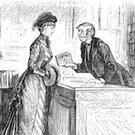Title: North and South
Author and Title: Elizabeth Cleghorn Gaskell. North and South
First Edition: London: Chapman and Hall, 1855. 2 volumes, post 8vo., 21s.
Serialization: Household Words, 2 September 1854 to 27 January 1855 (weekly)
Summary: Gaskell's social-problem novel and follow-up to Mary Barton. Margaret Hale is the daughter of a country clergyman and she lives with her aunt and cousin Edith in London. The marriage of Edith to Captain Lennox prompts her return to her parents in the rural village Helstone. There, Captain Lennox's brother Henry Lennox, a rising barrister, visits Margaret and proposes to her. She refuses him. Soon after, her father confesses his crisis of faith to her: asked by his bishop to reaffirm his belief in the thirty-nine articles, Mr. Hale finds he cannot in good conscious do so. As a result, he must give up his living. The family—Margaret, her father, her invalid mother, and loyal servant Dixon—pack up and move north to the factory city of Milton (read, Manchester) where Mr. Hale's old friend Mr. Bell owns property. There they meet Bell's tenant, the cotton-factory owner John Thornton, who wishes to be tutored by Mr. Hale. Thornton, one of the leading men of the town, rose by his own initiative to a position of wealth and prominence influenced greatly by his mother's principles of hard work and thrift. Initially, Margaret and Thornton each look askance at the other: Margaret views the manufacturer as a "tradesman" so not a gentleman; and Thornton views the poor clergyman's daughter as unjustifiably proud and arrogant. During her time in Milton, Margaret also meets the factory workers Nicholas Higgins and his consumptive daughter Betsy who she visits. Between Thornton and Higgins, Margaret learns about the tensions in the town between the masters and the men and the looming strike by the latter. When the strike does occur, everyone suffers. The strike ends in a riot: prompted by Thornton's decision to import workers from Ireland, the striking workers confront him at his factory where Margaret blocks a rock meant for Thornton. She is not seriously wounded, but Thornton, who realizes he loves Margaret, interprets the act as one of love on her side: he proposes but she refuses him. Meantime, Mrs. Hale falls seriously ill and on her death bed requests to see her son Frederick one last time. Her son during his time in the Royal Navy participated in a mutiny against a cruel and tyrannical captain. Under pain of death in England, he lives in Spain. Frederick risks capture and is present at his mother's death. While sneaking him out of town, Margaret is seen with him by Thornton (who assumes the man is her lover) and she is later forced to lie about being at the train station. The lie protects her brother but affects her character in Thornton's eyes. Higgins, as a leader of the strike, fails to find work until Margaret intercedes with Thornton on his behalf. Due to the influence of Margaret, both men become more sympathetic with the position of the other—Thornton in particular attempts some new "experiments" in management. When Margaret's father dies, she moves back to London with her aunt and learns that the childless Bell has made her the heir to his considerable fortune after his death. Unfortunately, Thornton's business fails due to the lingering effects of the strike. Come to London to tend to business matters with his new landlord Margaret, they profess their love to one another. Presumably her wealth will save his factory. (TJB)
Title Tags:
- Genre: Factory Novel
- Genre: Social Problem Novel
- Reprint Series: Penguin Classics (2016)
- Reprint Series: Nineteenth-Century Fiction (2019)
- Reprint Series: Oxford World's Classics (2017)
References: BL; EC; Sutherland; Vann
Texts
- Volume 1 from Google Books
- Volume 2 from Google Books
- Search for title at The Online Books Page (please note: the search will take you out of At the Circulating Library)
